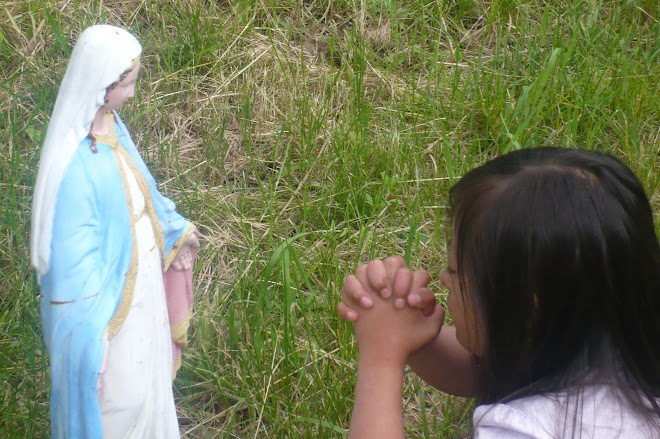 In a recent
address, Pope Francis described the family as the, "primary place for
education, the community of love and life in which every person learns to
relate to others and to the world." He continued, "All vocations make
their first steps in the family."
In a recent
address, Pope Francis described the family as the, "primary place for
education, the community of love and life in which every person learns to
relate to others and to the world." He continued, "All vocations make
their first steps in the family."
We Catholics
know this, deep down, but we have a tendency to deny the latter part of that
statement. Vocations are for other people’s kids, we tell ourselves, our
families aren’t perfect enough. We over-idealize those families who have
produced vocations to the priesthood and religious life. We place them on a
pedestal; imagining a large family filling the pew each morning at Daily Mass,
homeschooling in Latin, cheerfully doing farm chores all afternoon, then serenely
kneeling in the living room each evening for the family Rosary. These ideal
Domestic Churches have no loud arguments, no black sheep, and no doubts that their
children would serve the Church. Since our own families are not like those, we
reason that our children could not possibly have vocations to the religious
life.
Susie Lloyd, the best-selling Catholic
humorist, and homeschooling mother of her own large family, assures us that
these lofty images are accurate, some of the time. But there’s much more to
depth to families who produce vocations than we think, and in exploring their various
characteristics, we just might find our families have more in common with them than
we think.
In “Yes,
God!” LLoyd chronicles the childhood and vocation stories of nine men and women
religious, describing the details of their family which she believes brought
each of them to say “yes” to God’s call to religious life. Chapters are named
for the predominant strength which those religious and priests learned from
their families. There is “Yes to Strength”, “Yes to Duty”, “Yes to Generosity”.
No matter what the inherent strengths of a family, a vocation always begins
with a “yes” and a family which strived to serve God with their lives. Families
bring their particular gifts to their vocation whether their home was rural or
urban, athletic or artistic, rowdy, quiet, or just plain contentious!
These
families are not perfect. At times, Mrs. Lloyd points out; even the challenges
in the home were used by the Lord to help the future religious transform weakness
into virtue. This is true in the family of Sister Marie Jose de la Rosa S.C.C.
whose chapter is subtitled, “Yes to Spiritual Poverty”. Her father’s long term
unemployment and depression posed a daunting challenge for her mother who
worked to support and raise her children singlehandedly. For Mrs. Lloyd, it’s
not about perfection, number of children, or proximity to a Church building,
it’s about the attitude which engenders the person’s “yes” to God.
And the
attitude is not always universal. Sometimes a vocation comes as a surprise. One
of the funniest stories in the book involves Mrs. Lloyd’s inability to see the
great potential in a college friend, Fr Jeremy Paulin, OMV, now a Vocation
Director.
So it seems no one is off the hook when it
comes to raising Catholic children considering religious life, since no two
vocation-producing families are alike. Mrs. Lloyd’s characteristic humor keeps
the Catholic guilt light-hearted as she brings to light helpful habits which an
aspiring mother to a religious can implement in her Domestic Church. It’s a
lead by example book on Catholic parenting, and it will have you smiling at
both the strengths and faux pas of your own family as you read the captivating
stories.


